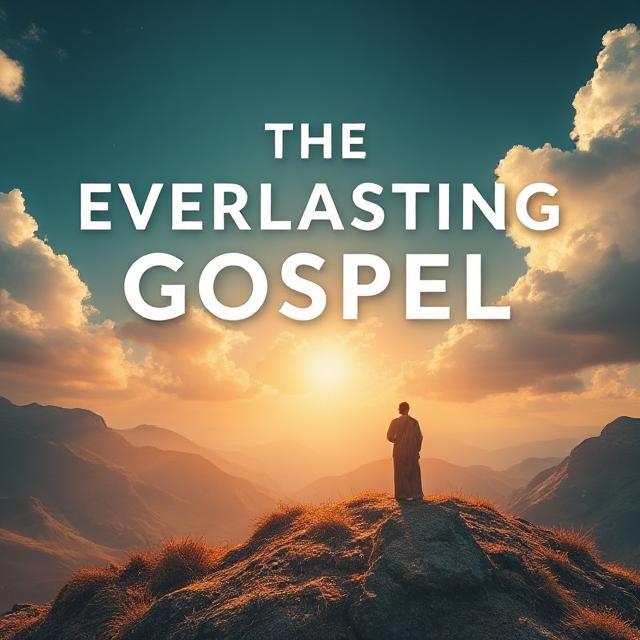
In this article, we will examine Revelation 14, a chapter full of rich prophetic symbolism and divine mysteries concerning the identity and mission of the 144,000 Jews, the everlasting gospel they will preach, and the culmination of events at the Battle of Armageddon. This chapter unfolds with different parts, including a detailed view of the 144,000 Jews, their mission and a deeper understanding of the gospel that will be proclaimed to the entire world during a critical juncture in history.
Verse 1 – 144,000 with the Father’s Name
Rev. 14:1 “And I looked, and, lo, a Lamb stood on the mount Zion, and with him an hundred forty and four thousand, having his Father’s name written in their foreheads.”
The scene opens with the 144,000 Jews standing on Mount Zion, having the Father’s name written on their foreheads. This is a significant moment that represents the return of the Lord for His millennial reign and His claim over the earth. The prophecy in Zechariah 8:3 affirms that the Lord will return to Mount Zion, making this location the focal point of His earthly rule.
The presence of the 144,000 Jews alongside Him means they recognize and accept the Lord Jesus as their King. The writing of the Father’s name on their foreheads signifies ownership and a complete identification with God. This identification goes beyond a literal mark; it symbolizes the indwelling attributes and character of God manifest in their lives. As the Lord Jesus stated in John 5:43, “I am come in my Father’s name,” name refers to the essence, authority, and character of God.
For the 144,000 Jews, having the Father’s name inscribed on their foreheads means their guiding principle, their “head” or leadership, is aligned with God’s character. It is a beautiful metaphor that signifies that they follow the Lamb, the Lord Jesus Christ, wherever He leads (Revelation 14:4). They are entirely dedicated, and their lives reflect the attributes of the One they serve.
Verse 2 – The Voice of Many Waters
Rev. 14:2 “And I heard a voice from heaven, as the voice of many waters, and as the voice of a great thunder: and I heard the voice of harpers harping with their harps.”
The voice described as “many waters” and “like thunder” represents the voice of the Lord Jesus (Revelation 1:15). This voice is both sweet and terrible—a depiction that conveys the multifaceted nature of God’s communication. His voice offers comfort, like the sound of many waters, but also demonstrates His authority and judgment, like the sound of thunder. The harpers accompanying this scene are most likely angelic beings, possibly seraphim, adding a musical backdrop to this majestic event.
Verse 3 – A New Song Only They Could Learn
Rev. 14:3 “And they sung as it were a new song before the throne, and before the four beasts, and the elders: and no man could learn that song but the hundred and forty and four thousand, which were redeemed from the earth.”
The 144,000 Jews sing a “new song” that no one else could learn. We all have a personal “life song” that reflects our testimony, and this particular song is unique to the 144,000 Jews. It is the story of their experience, their challenges, and their ministry during the Great Tribulation. This song is a testimony of their unwavering faithfulness and the gospel they declared amidst great hardship. The 144,000 Jews have a unique story, and their song reflects that—a powerful, exclusive testament of their journey and triumph.
Verse 4 – Virgins and First Fruits
Rev. 14:4 “These are they which were not defiled with women; for they are virgins. These are they which follow the Lamb whithersoever he goeth. These were redeemed from among men, being the firstfruits unto God and to the Lamb.”
The reference to them being “virgins” should be understood spiritually, not literally. It means that they were not defiled by the false teachings of the “woman” or church systems, specifically avoiding corruption by false doctrines, especially those stemming from the harlot, symbolic of the corrupted church. The 144,000 Jews are pure in their faith; they were never tainted by false or unsound teachings, such as the trinitarian doctrines that many follow.
They “follow the Lamb wherever He goes,” showcasing their complete allegiance to Christ. They are described as “first fruits,” indicating they are set apart as a pure and dedicated group, the best among the best, for God’s purposes.
Verse 5 – Blameless and Led by the Lamb
Rev. 14:5 “And in their mouth was found no guile: for they are without fault before the throne of God.”
Their integrity is evident as they speak no deceit and live blameless lives. They will be instrumental in feeding the everlasting gospel to the woman Israel during the Great Tribulation. Their lives and testimonies will shine as beacons of truth in a dark time, helping to guide the remnant of Israel.
Verse 6 – The Everlasting Gospel Preached to All Nations
Rev. 14:6 “And I saw another angel fly in the midst of heaven, having the everlasting gospel to preach unto them that dwell on the earth, and to every nation, and kindred, and tongue, and people.”
The “everlasting gospel” is proclaimed by the 144,000 Jews, spreading a message that is unchanging and eternal. The Greek word for gospel, “Evangelion,” means “good news.” It is called the everlasting gospel because it transcends time—from the beginning until the end, the good news has been consistent. The core of this message is salvation through the Lord Jesus Christ.
The bad news, as outlined in Romans 3:23, is that all have sinned and fall short of the glory of God. Sin carries the consequence of death (Romans 6:23), and the law was given to expose our inability to save ourselves. Galatians 2:16 declares that no one can be justified by works of the law, but only through faith in the Lord Jesus Christ. The law, rather than being a means of salvation, was given to increase our awareness of sin (Romans 5:20).
The good news is that God provided the answer to our predicament—salvation through the Lord Jesus Christ. He fulfilled the requirements of the law by offering Himself as the ultimate sacrifice. This everlasting gospel is the same message for all time—only through Christ can humanity be reconciled to God. No other sacrifice or effort can suffice; it has always been and will always be through the shedding of Christ’s blood that salvation is offered.
Verse 7 – Worship the Creator
Rev. 14:7 “Saying with a loud voice, Fear God, and give glory to him; for the hour of his judgment is come: and worship him that made heaven, and earth, and the sea, and the fountains of waters.”
The gospel message proclaimed by the 144,000 Jews can be summarized in this verse, which calls for worship of God, the Creator of heaven and earth. It emphasizes the eternal truth of God’s sovereignty and divinity. Ephesians 3:9 identifies the Lord Jesus Christ as the Creator, affirming His deity. In the end times, many will come to realize that the Lord Jesus Christ is truly God.
The everlasting gospel preached during this period will lead many Jews to salvation, especially as they are being protected and fed in the wilderness during the tribulation.
Verse 8 – The Judgment of Babylon
Rev. 14:8 “And there followed another angel, saying, Babylon is fallen, is fallen, that great city, because she made all nations drink of the wine of the wrath of her fornication.”
The second angel’s message also brings “good news” to Israel and those suffering during the Great Tribulation, as it announces the imminent destruction of Babylon. This declaration means that their troubles will soon end with the judgment and fall of the Antichrist and his kingdom.
The angel’s message specifically speaks against the influence of Roman Catholicism, which has ensnared so many in false doctrines and traditions. One-third of the world’s population today follows her teachings, represented as drinking her wine. She is referred to as a fornicator because she seeks to align herself with earthly powers and kingdoms, abandoning true devotion to God.
The 144,000 Jews will preach boldly against the Roman Church and condemn its corrupted system, proclaiming her fall and declaring God’s judgment upon her.
The Battle of Armageddon (Revelation 14:14-20)
Rev. 14:14-20 And I looked, and behold a white cloud, and upon the cloud one sat like unto the Son of man, having on his head a golden crown, and in his hand a sharp sickle. And another angel came out of the temple, crying with a loud voice to him that sat on the cloud, Thrust in thy sickle, and reap: for the time is come for thee to reap; for the harvest of the earth is ripe. And he that sat on the cloud thrust in his sickle on the earth; and the earth was reaped. And another angel came out of the temple which is in heaven, he also having a sharp sickle. And another angel came out from the altar, which had power over fire; and cried with a loud cry to him that had the sharp sickle, saying, Thrust in thy sharp sickle, and gather the clusters of the vine of the earth; for her grapes are fully ripe. And the angel thrust in his sickle into the earth, and gathered the vine of the earth, and cast it into the great winepress of the wrath of God. And the winepress was trodden without the city, and blood came out of the winepress, even unto the horse bridles, by the space of a thousand and six hundred furlongs.
The latter part of this chapter (verses 14-20) shifts the focus to the battle of Armageddon, the climactic event that will bring about the end of human rebellion against God. The Lord Jesus, with a “sharp sickle,” symbolizes His role as the divine harvester. The sickle is used for the final judgment, the harvest of the earth. This vivid imagery conveys the severity of God’s wrath against those who reject Him.
The “winepress” represents the battlefield of Armageddon, where God will pour out His wrath upon the gathered armies of the world. Joel 3:13 describes the gathering of grapes into the winepress, signifying the assembling of men for judgment. This is the ultimate outcome for those who resist God’s will.
The angel who “had power over fire” represents the purging and purification that will take place. This angel is executing the vengeance of God, fulfilling the prayers of the souls under the altar, who called for justice.
The “great winepress” is described as being outside the city of Jerusalem, with the land soaked in blood for about 200 miles—a grim depiction of the magnitude of this final confrontation. The involvement of hundreds of millions in this battle, as depicted in Joel 3:9-14, underscores the vast scope of this final judgment.
Conclusion
The Everlasting Gospel is a profound and unchanging message of hope and salvation, proclaimed throughout the ages, from Adam to the end of days. The 144,000 Jews will play a vital role in spreading this gospel during the tribulation, standing as beacons of light in a time of great darkness. They will declare the truth, untainted by false doctrines, and lead many to the saving knowledge of the Lord Jesus Christ.
The fall of Babylon and the final judgment will demonstrate God’s sovereignty and the fulfillment of His promises. The message of the gospel remains: there is salvation through Christ alone. The 144,000 Jews, the everlasting gospel, and the ultimate victory of God all point to one undeniable truth—God is in control, and His plan for redemption and justice will prevail.
The chapter ends on a note of hope, even amid the terrifying images of judgment. It reminds us that God’s justice will prevail, and His mercy is extended to those who follow Him. As we consider the 144,000 Jews and their unwavering commitment to the Lamb, we are encouraged to follow the Lord Jesus, not just in word, but in deed, striving to live lives that reflect His character and His truth, in a world desperate for the light of the everlasting gospel.
![]()




More Stories
THE PREHISTORIC EARTH
HE SAT WITH ME WHILE I WAS BROKEN
YOU WERE CHOSEN IN THE DARK